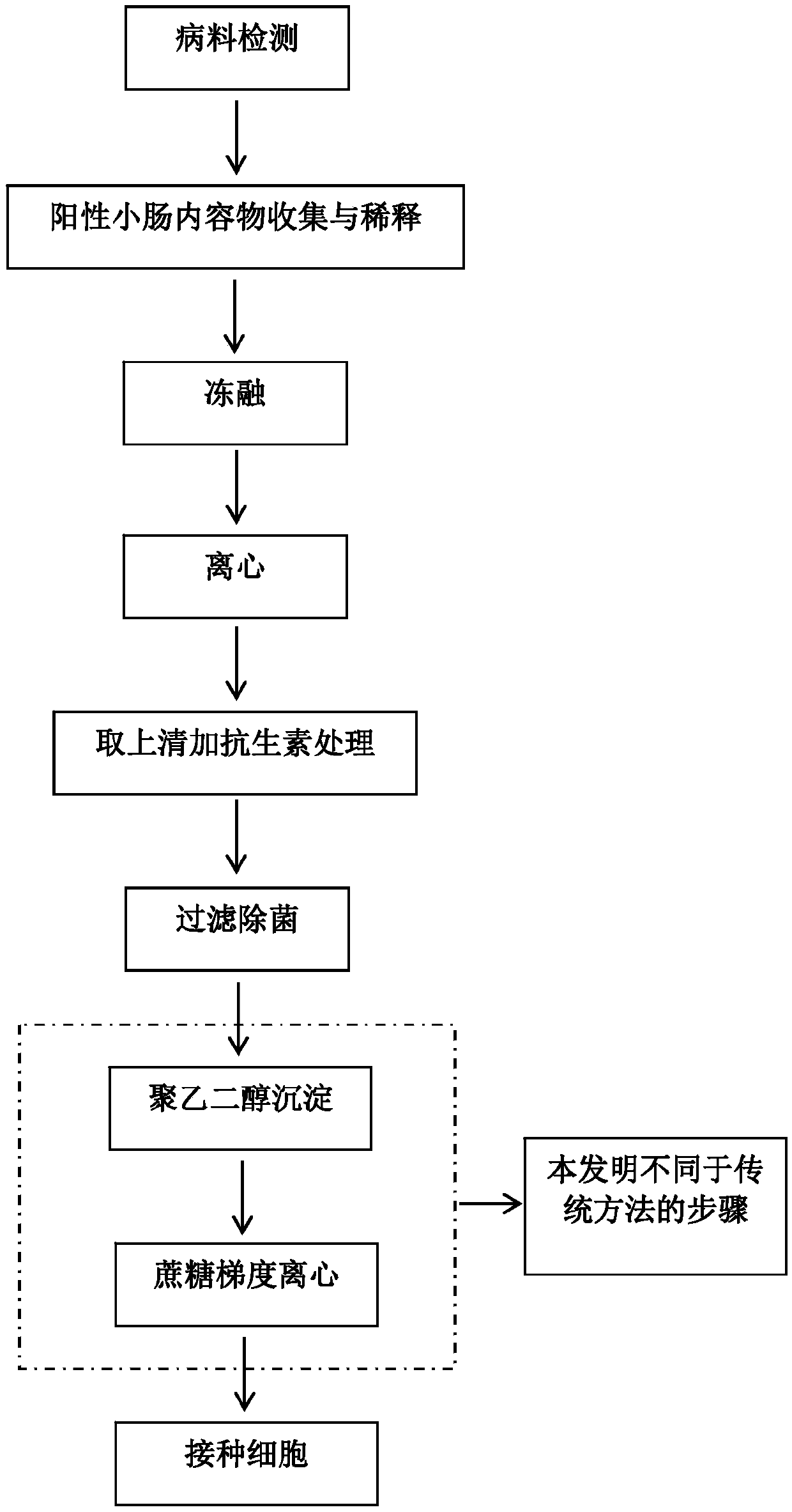Method for efficiently separating pig intestinal tract coronavirus
A coronavirus and pig intestinal technology, applied in the field of animal virology, can solve the problems of ineffective multiplication of viruses, abnormal growth of cells, lysis and death, etc.
- Summary
- Abstract
- Description
- Claims
- Application Information
AI Technical Summary
Problems solved by technology
Method used
Image
Examples
Embodiment 1
[0027] The isolation rate of porcine epidemic diarrhea virus (PEDV) is compared by adopting the method of the present invention and the traditional method (control). The same sample was treated by two methods at the same time, and then inoculated into one well of African green monkey kidney passage cells (referred to as Vero cells) cultured in a 6-well plate.
[0028] Method of the present invention:
[0029]The test samples were 43 small intestines of piglets positive for porcine epidemic diarrhea virus (PEDV) (the implementation of the present invention is not limited to this virus) detected by RT-PCR in a pig farm in Hubei Province by the applicant in 2016. The specific operation method is as follows: Aseptically collect the contents of the small intestine of piglets in an ultra-clean bench, add an equal volume of serum-free DMEM culture solution (purchased from GIBCO Company), mix well, place at -80°C and freeze-thaw repeatedly 3 times, 5000r / min Centrifuge for 15 minutes...
Embodiment 2
[0035] The isolation rate of porcine deltacoronavirus (PDCoV) was compared by adopting the method of the present invention and the traditional method (control). The same sample was treated by two methods at the same time, and then each well was inoculated into a well of passaged porcine kidney cells (LLC-PK1 cells for short) cultured in a 6-well plate.
[0036] Method of the present invention:
[0037] The experimental samples were 40 small intestines of piglets tested positive for PDCoV by RT-PCR in a pig farm in Hebei Province in 2017. The specific operation method is as follows: Aseptically collect the contents of the small intestine of piglets in an ultra-clean bench, add an equal volume of serum-free MEM culture solution (purchased from GIBCO), mix well, place at -80°C for 3 times, and centrifuge at -80°C for 3 times. After 15 minutes, take the supernatant into another sterile centrifuge tube, centrifuge at 10,000r / min for 1h, take the supernatant, add penicillin at a fi...
Embodiment 3
[0043] The method of the invention and the traditional method (control) are used to compare the isolation rate of porcine transmissible gastroenteritis virus (TGEV). The same sample was treated by two methods at the same time, and then each well was inoculated with pig testicular passage cells (ST cells) cultured in a 6-well plate.
[0044] Method of the present invention:
[0045] The test samples were 50 small intestines of piglets that were tested positive for TGEV by RT-PCR in a pig farm in Hubei Province in 2017. The specific operation method is as follows: Aseptically collect the contents of the small intestine of piglets in an ultra-clean bench, add an equal volume of serum-free DMEM culture solution (purchased from GIBCO Company), mix well, place at -80°C for three times of repeated freezing and thawing, and centrifuge at 5000r / min 15min, take the supernatant to another sterile centrifuge tube, centrifuge at 10000r / min for 1h, take the supernatant, add penicillin and ...
PUM
| Property | Measurement | Unit |
|---|---|---|
| separation | aaaaa | aaaaa |
| separation | aaaaa | aaaaa |
| separation | aaaaa | aaaaa |
Abstract
Description
Claims
Application Information
 Login to View More
Login to View More - R&D
- Intellectual Property
- Life Sciences
- Materials
- Tech Scout
- Unparalleled Data Quality
- Higher Quality Content
- 60% Fewer Hallucinations
Browse by: Latest US Patents, China's latest patents, Technical Efficacy Thesaurus, Application Domain, Technology Topic, Popular Technical Reports.
© 2025 PatSnap. All rights reserved.Legal|Privacy policy|Modern Slavery Act Transparency Statement|Sitemap|About US| Contact US: help@patsnap.com



